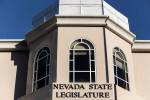Spending on lobbying Nevada Legislature declines
CARSON CITY -- Forced to pinch pennies because of the recession and declining tax revenue, local governments and school districts spent a combined 19 percent less on lobbying the Nevada Legislature in 2011 than they did during the previous session in 2009.
The biggest reductions were made by Clark County and the Clark County School District, both of which relied almost exclusively on their own employees rather than typically higher-paid contract lobbyists to represent their interests to lawmakers.
All governments were required to submit their expenditures in July with the Department of Taxation, which released them to the Review-Journal on Friday.
Even Clark County Coroner Mike Murphy was part of the county's eight-member lobbying team, and Bonanza High School Principal Bart Mangino was one of the school district's five registered lobbyists.
In all, governments in Nevada reported to the Department of Taxation that they spent $2.948 million on lobbying, compared with $3.618 million in 2009.
Clark County lobbying expenses dropped to $348,948, down 29 percent from $487,781 in 2009, while the school district spent $254,616, a 35 percent drop from $390,702.
Most of the money went to salaries, lodging and meals of lobbyists. The salaries of full-time employees, prorated for the four-month legislative session, were a large part of their lobbying costs.
The decline in lobbying expenditures should be welcome news to taxpayers throughout Southern Nevada at a time governments are struggling to stay afloat. Nevada Taxpayers Association President Carole Vilardo said she is pleased local government took spending reduction steps, such as using their own employees as lobbyists, during this recessionary period.
Their expenses dropped though schools and local governments spent much of their time combating moves by Gov. Brian Sandoval to take some of their funds and use this money to balance the state budget. Their efforts were successful as Sandoval and legislators agreed to continue more than $600 million in so-called sunset taxes instead of taking some of their revenues.
STAFF LOBBYIST USE PRAISED
Vilardo said Friday that it makes sense for governments and schools to use in-house lobbyists because such people are likely more knowledgeable about issues affecting their employers than are contract lobbyists.
"I give them credit. I think their issues are better handled in house than hiring a lobbyist," said Vilardo, herself a lobbyist for more than 30 years.
In contrast, much of the lobbying for North Las Vegas was handled by contract lobbyist Dan Musgrove. Henderson's lobbying team included contract lobbyists Rene Ashleman and Richard Perkins. Las Vegas, the most populous city in Nevada, also employed Ashleman.
Perkins is a former Henderson police chief and a former speaker of the Nevada Assembly.
In its report, North Las Vegas, the state's fourth-largest city, reported total lobbying expenditures of $230,396, including $85,210 on lobbyist pay. That was a drop of 24 percent.
Henderson, the second-most populous city in the state, reported $312,867 in lobbying expenses, including $114,000 on non-employee lobbyist pay. Its expenditures were up 11 percent.
Musgrove said he charged North Las Vegas a flat $9,000 a month for lobbying during the four-month legislative session. He and City Clerk Karen Storms were the city's only full-time lobbyists.
Vilardo doubts the day will come when all local governments and schools use only their own employees to lobby legislators. Some are just too small and cannot afford the costs of keeping someone in Carson City so instead hire a contract lobbyist, she said. Contract lobbyists may represent many clients.
With them, you are not responsible for food, lodging and transportation costs, she added.
No lobbying expense report was filed by the Washoe County School District, whose superintendent, Heath Morrison, and chief lobbyist, Craig Hulse, were regular attendees at the Legislature.
A school district spokeswoman said Hulse is no longer a district employee, and there was a communication failure on who should file the reports. She said reports would be filed in the next few days.
LOBBYING REPORTS REQUIRED
Each July following a legislative session, local governments, including schools and police departments, are required by law to file reports showing their exact expenditures on lobbying. The reports must show what lobbyists were paid, what they spent on food, lodging, entertainment and supplies, and their travel costs.
These reports are a far better indication of actual lobbying expenses than the monthly reports during the session that lobbyists must file with the Legislative Counsel Bureau.
The monthly reports show only what lobbyists spend on legislators, not their own expenses.
According to those reports, the Legislature's 875 registered lobbyists spent a combined $118,711 on wining and dining legislators during the 2011 session.
Contact Capital Bureau Chief Ed Vogel at evogel@reviewjournal.com or 775-687-3901.























